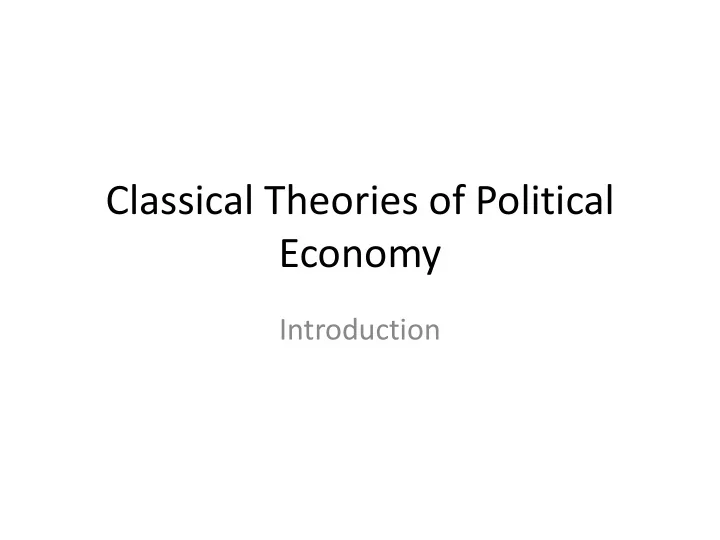

Classical Theories of Political Economy Introduction
Introductions, etc. • Beverly Crawford, Stephanie Ballanger, Beth Rabinowitz • The syllabus is at: • http://bev.berkeley.edu • Facebook Group: “Political Economy” • Books: Karl Polanyi, The Great Transformation Beacon Press • Adam Smith, The Wealth of Nations • Sommerville and Santoni, eds., Social and Political Philosophy • Other readings online and also available at Copy Central
Terms and Conditions Required attendance at all class sessions • Come to class on time • Class participation (lecture and section) • Complete reading for each session before class • No use of lap tops, iPads, other tablets or smart phones in • class…take notes with pen/pencil and paper Required subscription to the Wall Street Journal or Financial Times • newspaper (digital edition is ok) Assignments: Midterm, Final, and section assignments as part of • your participation grade In-Class Midterm is tentatively scheduled for October 25 • In-Class Final Exam is scheduled for TUESDAY, DECEMBER 13, 2011 • 8-11A – PLEASE DO NOT BUY PLANE TICKETS OR MAKE OTHER PLANS. THERE WILL BE NO EARLY OR LATE EXAMS.
A real world dilemma: The aftermath of Hurricane Katrina
The Ninth Ward Today
“Price Gouging” or simply price that reflects supply and demand?
Political Economy Political Economy: Two forces—Two of the three most important forces in human life---- • politics and economics- - that are inextricably linked • but two forces which actually oppose one another in the present period. • The relationship between power and wealth. Two of the most important driving forces in the • world today. The psychology of political economy is not very attractive: • pursuit of wealth driven by greed and envy; – pursuit of power driven by pride and insecurity. – They are related – Is there a difference between power and wealth? Don't both involve the control of vast • amounts of resources? Yes, but with wealth you control only material resources that can be translated into money. With power, you control resources that aren't tangible--wealth gives you material goods to • satisfy your greed for more THINGS---power gives you something else that every human being wants—RECOGNOTION and SECURITY. Indeed, most of life is dominated by this non-materialistic need for respect and recognition—and security.
Central Course Questions and how we will answer them • Who gets what? • “Says Who?” • Normative vs. descriptive theories of political economy • What do people deserve? • How things are…how they can be….how they should be… • How do we know if our beliefs about what people deserve are right?
Schumpeter: Ideology as unconscious rationalization "For ideologies are not simply lies; they are truthful statements about what a man thinks he sees. Just as the medieval knight saw himself as he wished to see himself--defender of the weak and innocent-- and just as the modern bureaucrat sees himself as protector of the Common Good and just as both failed and fail to see whatever may be adduced against their self- perception, so every other social group develops a protective ideology which is nothing if not sincere. If we are not aware of our rationalizations-how then is it possible to recognize and to guard against them?"
Public Policy Debates • Are they just a volley of dogmatic assertions and ideological food fights?
Reason as a guide: – Start with a real problem – Examine your opinion of how that problem should be solved – What are your reasons behind those convictions? – On what principle is that reason based?
Three Principles This was McCain’s position when he advocated free trade….. • • The Second Approach we will discuss is based on the principle of equality — • or more broadly, a critique of Liberalism-that focuses on “fair” distribution. Because the market creates winners and losers, . • The Third Approach is is based on the principle of community. That markets • encourage selfishness of individuals, but that the economy should work for the broader community. The community at whatever level should control the market for the good of the community—the nation—as a whole. that of Economic Nationalism and Communitarianism. This approach also says that the state should run the economy, but it should allow markets to operate. The state, however, must control the markets. It must maake sure that no other economic powers exploit its economy. It protects its own economy and promotes its businesses abroad. It is not laissez faire. Community
The Freedom Principle: Two Camps • Laissez-faire • Fairness
Warren Buffet Complains about lack of fairness • “While the poor and middle class fight for us in Afghanistan, and while most Americans struggle to make ends meet, we mega-rich continue to get our extraordinary tax breaks. These and other blessings are showered upon us by legislators in Washington who feel compelled to protect us, much as if we were spotted owls or some other endangered species. It’s nice to have friends in high places.” --Warren Buffet, August 2011
The Equality Principle • Markets are unfair because they are exploitative • we are all equal and therefore should not exploit one another.. • Social justice means respecting human equality, • If the market doesn’t allow this, there should be some social redistribution.
The Community Principle • The community represents a higher value than individual freedom.. – Communities must engage in “shared sacrifice” • Greed is a bad way of being. Why?
All debates in political economy are over these three principles • disagreement about meaning: • Conflict among the three principles and the three ideas about justice that they represent. • Examples: – Abortion – Taxing the wealthy to help the poor – Affirmative Action – Gay marriage
Recommend
More recommend